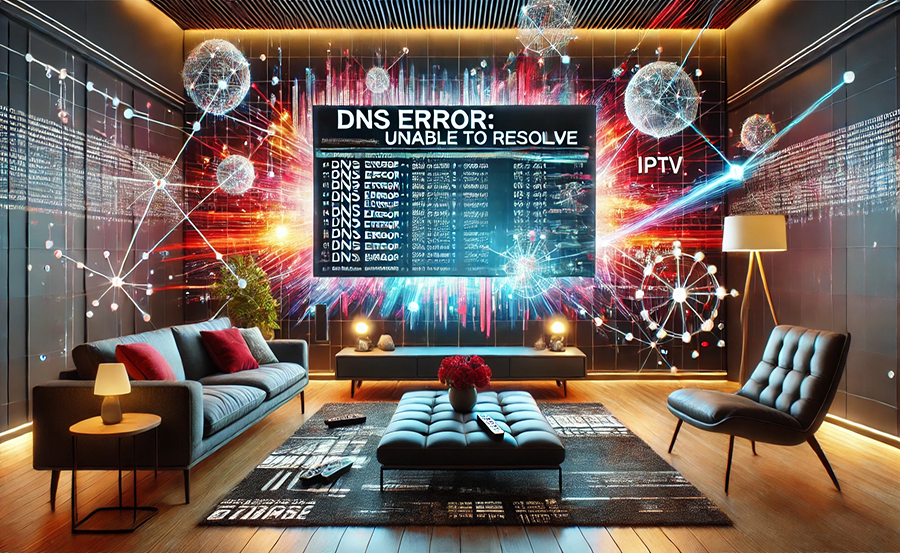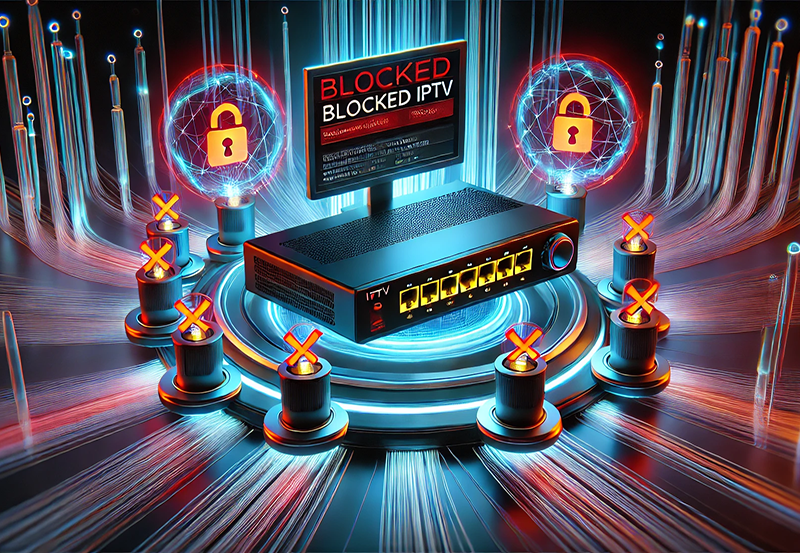In today’s fast-paced digital world, IPTV (Internet Protocol Television) has taken center stage in how we consume media content. However, this fabulous way of streaming can occasionally be hampered by technical issues, particularly DNS (Domain Name System) problems. These issues can disrupt your streaming experience, especially if you’re using IPTV for Android devices or subscribing to Global IPTV services. Let’s embark on a journey to revolutionize your IPTV adventure by tackling these challenges head-on.
Understanding the Root Causes of DNS Problems in IPTV
Before diving into solutions, we must first understand what causes DNS issues in IPTV services. The Domain Name System is essentially the “phonebook of the Internet,” translating domain names into IP addresses. When DNS issues arise, it can prevent your device from connecting to IPTV servers.
The common causes of DNS problems include network configuration errors, outdated DNS settings, or ISP-level DNS blocking. Identifying these is crucial because understanding them allows for more effective troubleshooting and solutions.
Smart Advice:
Secure your entertainment for a full year with a 1 Year IPTV Subscription, offering uninterrupted access to live TV.
Network Configuration Errors
Network configuration errors occur when there are mismatches or incorrect settings within your network that lead to connectivity problems. This can stem from incorrect IP settings or changes made without proper documentation.
One might also encounter misconfigured routers, which result in DNS issues affecting IPTV streams. Ensuring your network is correctly set up can prevent these problems from occurring.
Outdated DNS Settings
Many users forget to update their DNS settings regularly, leading to inefficient DNS resolution. An outdated DNS can slow down or even stop your IPTV services from functioning correctly.
Keeping your DNS settings up-to-date ensures faster access and a smoother streaming experience. This proactive step is often overlooked but is fundamental for optimal performance.
ISP-Level DNS Blocking
Sometimes, your Internet Service Provider (ISP) may block certain DNS requests to control traffic or prevent access to specific content. This is a more complex issue but not insurmountable.
Understanding and navigating around ISP-level blocks requires knowledge of alternative DNS services and how to configure them on your devices, ensuring uninterrupted access to your preferred IPTV service.
17 Proven Strategies to Resolve DNS Problems in IPTV
1. Switch to a Public DNS Provider
One of the simplest yet effective methods is switching to a public DNS provider. Popular options include Google DNS and OpenDNS, which are known for their reliability and speed. These providers can bypass ISP restrictions and enhance your IPTV performance.
2. Update Your Router’s Firmware
Oftentimes, routers running on outdated firmware can cause DNS resolution issues. Checking for and installing the latest router firmware can often improve your DNS resolution capabilities, leading to a smoother IPTV experience.
3. Customize DNS Settings on Your IPTV Device
Directly configuring DNS settings on your IPTV device ensures that it adheres to the DNS you prefer, not the default one assigned by your ISP. This is particularly useful for Android-based IPTVs, where manual DNS settings can shield against ISP blocks.
4. Reboot Your Network Equipment
Although a simple solution, rebooting your modem, router, and IPTV device can resolve a range of networking errors. It allows the devices to refresh their network settings and potentially clear up minor DNS issues.
5. Clear DNS Cache
Clearing the DNS cache on your device removes stored DNS results that may be outdated or incorrect, which often resolves connectivity issues by forcing the device to fetch up-to-date DNS information.
6. Use a VPN for Secure Connections
Virtual Private Networks (VPNs) can help route your internet traffic through a separate DNS server, bypassing ISP-related DNS blocks. VPNs with built-in DNS leak protection ensure your DNS requests remain private and unblocked.
7. Check for IP Address Conflicts
IP conflicts in your network can cause connectivity issues, thereby impacting DNS effectiveness. Check that each device in your network possesses a unique IP address to prevent routing conflicts.
8. Opt for a Wired Connection
While wireless connections are convenient, they may not always provide the stability needed for IPTV services. A wired Ethernet connection can reduce packet loss and improve DNS request reliability.
9. Disable Firewall or Security Software Temporarily
Overactive firewall or security software can inadvertently block legitimate DNS traffic. Temporarily disabling these can determine if they’re the source of DNS issues, although caution is advised.
10. Contact Your ISP
If DNS issues persist, contacting your ISP can be a beneficial step. They may provide insights into any restrictions or assist with customizing your DNS settings.
11. Explore Other IPTV-Optimized DNS Options
Some DNS services are fine-tuned for media streaming. Researching and opting for such services can often provide better performance and reduce buffering in IPTV.
12. Utilize Quality of Service (QoS) Settings
Configuring QoS settings in your router prioritizes IPTV traffic, reducing congestion and improving DNS efficiency. This setup is excellent for households where bandwidth is limited.
13. Maintain Regular Firmware and Software Updates
Regular updates to your router, IPTV software, and security protocols ensure that you’re protected with the latest security patches and performance enhancements.
14. Perform a Full Network Diagnostics
Conducting a full diagnostic on your network can identify specific DNS issues and provide solutions to resolve errors, increasing overall network performance.
15. Reset Your Network to Default
Resetting your network configuration to default settings can clear persistent issues, enabling you to start fresh with correct DNS configurations.
16. Adjust MTU Settings
Incorrect MTU settings can result in fragmented packets, impacting DNS communications. Adjusting these settings can improve data flow and DNS packet handling.
17. Employ a Smart DNS Service
Unlike a typical DNS, Smart DNS services are optimized for streaming geo-restricted content. These services route only a portion of your traffic, enhancing speed and resolution for IPTV.
Looking to the Future of IPTV
The journey towards a seamless IPTV experience, free from pesky DNS issues, requires both knowledge and tactical application of the strategies discussed above. With ongoing advancements in technology and network management, resolving these issues become more intuitive and integrated into our digital lives.
Embracing these changes and keeping informed can significantly enhance not only your IPTV streaming but all aspects of your digital interactions. As we continue to revolutionize your IPTV adventure, being proactive and educated remains your greatest ally.
FAQs

How often should I update my DNS settings for IPTV?
While there’s no fixed schedule, it’s advisable to review and update your DNS settings whenever you face connectivity issues or notice a dip in performance. Quarterly checks can also ensure you’re using the most optimized settings.
Can changing DNS improve my IPTV streaming quality?
Yes, switching to a reputable DNS provider can enhance speed and reliability, reducing buffering and improving overall streaming quality. Providers like Google DNS often offer faster resolution times.
Does using a VPN affect my IPTV performance?
A VPN can both positively and negatively affect performance. While it ensures privacy and can bypass ISP throttling, it might reduce speed slightly due to encryption overhead. Choosing a high-speed, reliable VPN minimizes this impact.
What’s the difference between a Smart DNS and a regular DNS for IPTV?
A Smart DNS is tailored for streaming and bypassing geo-restrictions, while a regular DNS handles general internet requests. Smart DNS services are often faster for streaming applications as they don’t encrypt traffic like VPNs.
Do ISP-level blocks affect all IPTV services?
Not necessarily. The impact depends on your ISP’s policies and the IPTV solutions in context. Some services may remain unaffected, especially if they’re designed to circumvent such blocks through custom DNS solutions.
Is it safe to adjust my router’s MTU settings?
Adjusting MTU settings can be done safely with caution. Ensure to document current settings before changes and refer to your router’s manual. Incorrect settings could lead to connectivity issues if not handled properly.
Solving IPTV Freezing Issues with Simple Connectivity Fixes





